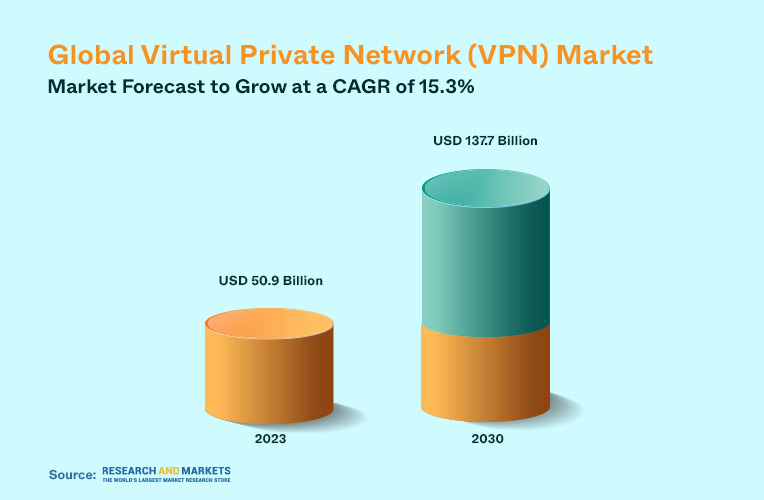
The demand for VPN (Virtual Private Network) apps is skyrocketing, driven by growing concerns over online privacy and security. For businesses and entrepreneurs, learning how to build a VPN app offers a lucrative opportunity to tap into a booming market. But where do you start? What features should you include? What is the estimated cost and timeline for development?
In this VPN app development guide, we’ll explore everything you need to know, from essential features to pricing and timelines, while ensuring your app is competitive and meets users’ expectations.
A VPN app enables users to secure their internet connection by encrypting data and masking their IP address. This enhances privacy and allows users to access content restricted in their regions.
Building a VPN app gives you access to a market with immense growth potential. As businesses and individuals seek solutions for secure browsing, there’s never been a better time to invest in VPN app development.

When you build a VPN app, focus on features that prioritize user security, ease of use, and customization. Below are the must-haves:
The backbone of any VPN is robust encryption protocols like AES-256. This ensures that user data remains private and safe from cyber threats.
Offer a wide range of server locations worldwide to give users flexibility in bypassing geographical restrictions.
A kill switch automatically disconnects users from the internet if the VPN connection drops, preventing data leaks.
Ensure your VPN app works seamlessly on iOS, Android, Windows, and macOS to reach the widest audience.
Privacy-conscious users prefer VPN apps that don’t track or store their online activities.
Slow speeds can ruin the user experience. Optimize your app for fast and stable connections.
A simple, intuitive UI ensures that users can connect to VPN servers with ease, even if they’re not tech-savvy.
Include flexible pricing models, such as monthly subscriptions, yearly plans, or a free trial.
For a competitive edge, consider adding:
Begin by understanding your target audience. Identify their pain points, preferences, and the features they value most in a VPN app.
Create a detailed list of the features you want to include. Collaborate with developers to determine technical feasibility and requirements.
The tech stack for a VPN app typically includes:
A clean and simple interface is crucial for user retention. Hire experienced UI/UX designers to ensure your app is visually appealing and functional.
This involves building both the front-end and back-end, integrating VPN protocols, and setting up servers. Consider hiring experienced developers or partnering with a VPN app development company.
Test your app across different devices and operating systems to identify and fix bugs. Performance, security, and usability testing are essential.
Once your app is ready, launch it on app stores and promote it through digital marketing campaigns, including SEO, social media, and paid ads.
The cost to build a VPN app varies depending on features, development complexity, and your choice of developers. Here’s a breakdown:
These estimates include the cost of development, server infrastructure, testing, and launch.
When it comes to VPN software pricing, flexibility is key. Popular VPN apps like Symlex Layer So offer multiple pricing tiers to cater to different users.
Additionally, consider offering family or team plans for businesses and households.
The timeline for building a VPN app depends on your app’s complexity and development team’s expertise. Below is a rough estimate:
Faster timelines may be achievable with a larger team, but it’s important to prioritize quality over speed.
Setting up reliable and secure servers worldwide can be complex. Partner with cloud providers or VPN server hosting services to streamline this process.
Different countries have varying rules regarding VPN usage. Research legal requirements and comply with them to avoid issues.
The market is crowded, so focus on delivering unique features or superior performance to stand out.
Building a VPN app is an exciting yet challenging endeavor. By focusing on user-centric features, understanding VPN software pricing, and partnering with skilled developers, you can create an app that meets market demands and thrives in a competitive landscape.
As the need for online privacy grows, so does the opportunity for innovation in this space. Now is the perfect time to invest in VPN app development and make your mark in this ever-expanding industry.